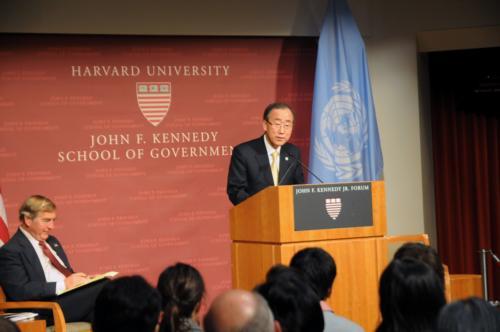
News
Summers Will Not Finish Semester of Teaching as Harvard Investigates Epstein Ties

News
Harvard College Students Report Favoring Divestment from Israel in HUA Survey

News
‘He Should Resign’: Harvard Undergrads Take Hard Line Against Summers Over Epstein Scandal

News
Harvard To Launch New Investigation Into Epstein’s Ties to Summers, Other University Affiliates

News
Harvard Students To Vote on Divestment From Israel in Inaugural HUA Election Survey
UN Secretary General Credits JFK’s Influence

The location of United Nations Secretary General Ban Ki-Moon’s speech at Harvard yesterday was ironically fitting; Ban spoke of the influence President John F. Kennedy ’40 had on his life while standing in the Institute of Politics forum bearing the president’s name.
In his introduction of Ban, former Kennedy School dean Graham T. Allison ’62 recalled that he first met the South Korean native when he arrived at the Kennedy School as a Master of Public Administration student in 1983.
“He shook my hand and said, ‘My name is JFK, just from Korea,’” Allison said.
At the start of his own speech, Ban said his experience meeting Kennedy as a teenager inspired him to pursue a career in diplomacy.
After serving in his country’s Ministry of Foreign Affairs, Ban spent 12 years working for the United Nations before being named Korea’s Foreign Minister in 2004. In 2006 he was selected to replace Kofi Annan as UN Secretary General.
After reminiscing on his graduate school days, Ban then addressed his five top concerns as Secretary General: global financial stability, climate change, global health, terrorism, and nuclear disarmament.
“These global public goods distinguish themselves because they endanger all countries, whether rich or poor, small or big,” Ban said.
Ban called terrorism and weapons of mass destruction “the most serious threat to international peace and security.”
He said that nuclear disarmament and the move toward a WMD-free world would be the best path to achieve international peace. He attributed multiple governments’ reluctance to adopt this policy to their misunderstanding of the U.N.’s disarmament plan.
To prevent terrorism, Ban encouraged countries to explore nontraditional security measures and involve civic organizations and other countries in their security policy.
Calling climate change “a truly defining issue of our era,” Ban said the countries most affected by climate change will be those that have contributed the least to the problem. He also said he hoped that an international climate change treaty could be ratified by next December.
While he lauded Harvard’s sustainability plan, he called upon the entire United States to take a leadership role, not only in combating climate change, but also in dealing with larger UN issues.
“Unfortunately, over the past few years, the relationship has not been desirable,” he said, eliciting laughter from the audience.
Ban said he was pleased about the progress made on global health issues, particularly the active role governments and the business community have played in helping eradicate diseases.
Ban also emphasized that he is working to make the UN “more transparent and more accountable” to improve its global image.
—Staff writer Lauren D. Kiel can be reached at lkiel@fas.harvard.edu.
Want to keep up with breaking news? Subscribe to our email newsletter.
